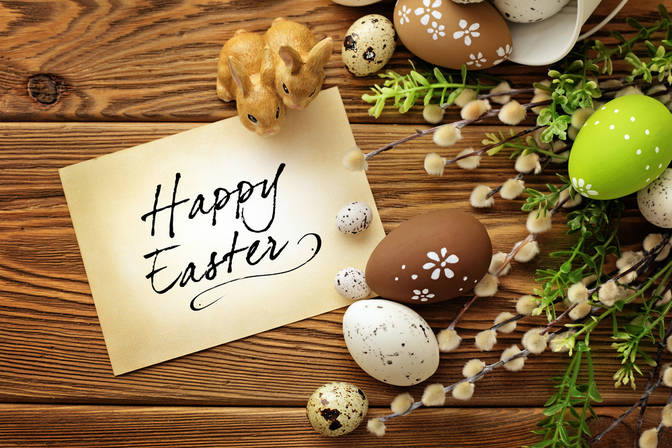La Pasqua
20 aprile, domenica

Storia
La storia della Pasqua è strettamente legata alla festività ebraica della Pasqua, che celebra la liberazione del popolo ebraico dalla schiavitù in Egitto. Gesù Cristo fu crocifisso durante la Pasqua e la sua resurrezione avvenne poco dopo. Pertanto, la Pasqua cristiana ha ereditato molti simboli e tradizioni dalla Pasqua ebraica.
La Pasqua non ha una data fissa e viene celebrata la prima domenica dopo la prima luna piena che segue l'equinozio di primavera (di solito tra il 22 marzo e il 25 aprile). Nei paesi ortodossi, la data della Pasqua può differire da quella dei cattolici e dei protestanti, poiché viene calcolata secondo il calendario giuliano, mentre i cristiani occidentali utilizzano il calendario gregoriano.
Tradizioni e rituali:
La Pasqua viene celebrata in modi diversi a seconda delle culture e delle tradizioni locali.
Nella cristianità orientale (ortodossia):
Uova di Pasqua. Uno dei principali simboli della Pasqua sono le uova decorate. Nei paesi ortodossi, le uova vengono spesso tinte di rosso, simboleggiando il sangue di Cristo. Le uova vengono benedette in chiesa e poi donate l'una all'altra con auguri di gioia e prosperità.
Kulich e Paskha. In Russia, Ucraina, Grecia e in altri paesi ortodossi, si preparano piatti speciali: kulich (pane dolce alto) e paskha (desserti a base di ricotta). Questi piatti simboleggiano l'abbondanza e la gioia della vita.
Processioni. In molti paesi del mondo ortodosso, durante la Pasqua si svolgono processioni: parate festive attorno alle chiese con canti e icone che simboleggiano la resurrezione di Cristo.
Nella cristianità occidentale (cattolici e protestanti):
Coniglietti di Pasqua e caccia alle uova. Nei paesi occidentali, come gli Stati Uniti, la Germania e il Regno Unito, il coniglio di Pasqua (simbolo di fertilità) è un'immagine popolare. Si svolge anche una caccia alle uova, in cui i bambini cercano uova di cioccolato nascoste in casa o all'aperto, diventando parte della celebrazione laica.
Pranzo di Pasqua. In Europa e in America, è comune organizzare un pranzo di Pasqua, in cui si servono piatti come agnello arrosto, verdure e vari dolci. Nel Regno Unito, è tradizionale preparare i panini "hot cross buns" con una croce sulla superficie, che simboleggia la crocifissione.
Nei paesi dell'America Latina, la Pasqua è accompagnata da colorate processioni religiose. Ad esempio, in Guatemala e in Spagna, durante la Settimana Santa (l'ultima settimana prima della Pasqua), si svolgono solenni processioni con icone e statue di santi. Questo è un momento di profonda riflessione spirituale.
La Pasqua negli altri anni
La Pasqua in altri paesi
- Albania
- Angola
- Argentina
- Armenia
- Australia
- Austria
- Bangladesh
- Belgio
- Bielorussia
- Bosnia-Erzegovina
- Brasile
- Bulgaria
- Canada
- Cile
- Cipro
- Colombia
- Croazia
- Danimarca
- Ecuador
- Egitto
- Estonia
- Etiopia
- Finlandia
- Francia
- Georgia
- Germania
- Giamaica
- Grecia
- India
- Indonesia
- Irlanda
- Islanda
- Italia
- L'Eritrea
- Lettonia
- Liechtenstein
- Lituania
- Lussemburgo
- Messico
- Moldavia
- Monaco
- Montenegro
- Norvegia
- Nuova Zelanda
- Paesi Bassi
- Perù
- Polonia
- Portogallo
- Regno Unito
- Repubblica Ceca
- Romania
- Russia
- San Marino
- Serbia
- Slovacchia
- Slovenia
- Spagna
- Svezia
- Svizzera
- Tagikistan
- Turkmenistan
- Ucraina
- Ungheria
- Uruguay
- Uzbekistan
- Vaticano
- Venezuela
- Zimbabwe
